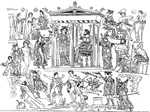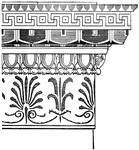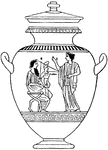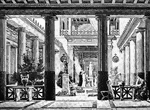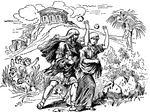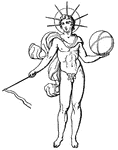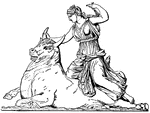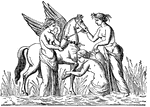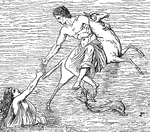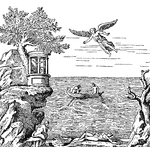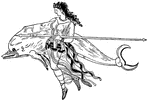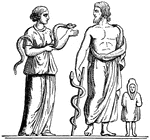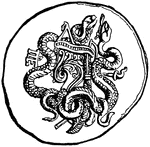
Cistophorus
The back of a Greek silver coin weighing on the average around 193 grains, first issued by the kings…

George I, King of Greece
George I (born Prince William of Schleswig-Holstein-Sonderburg-Glücksburg; 24 December 1845 – 18…
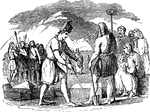
Founding of Argos
"Navigation for the purpose of commerce, and the art of writing, are said to have originated with the…
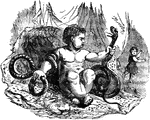
Young Hercules
"Hercules, a Theban prince, was another of the descendants of Pelops. The numerous and extraordinary…
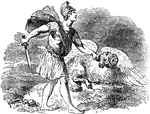
Phryxsus and ram
"When Phryxsus arrived in Colchis, he sacrificed his winger ram to Jupiter, in acknowledgement of the…
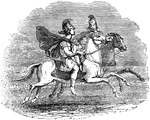
Theseus and Helen
"In the year 1234 B.C., Theseus came to the throne of Athens. He was one of the most renowned characters…
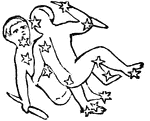
Gemini
"The third sign of the zodiac, so named from its 2 brightest stars, Castor, of the 1st magnitude, farthest…
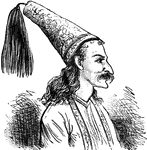
Greek
"The Greeks belong to the great Indo-European race, who from the earliest times have been the conquerers…
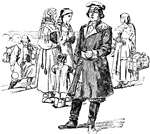
People of Odessa
"Odessa is the chief city of southern Russia, and men from all the countries about come here to trade."…
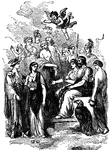
Pandora
"Epimetheus had in his house a jar in which were kept certain noxious articles, for which, in fitting…
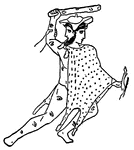
Argus
"Now Argus had a hundred eyes in his head, and never went to sleep with more than two at a time, so…
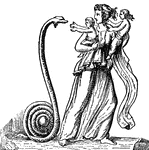
Leto or Latona
"The persecution which Latona experienced from Juno is alluded to in the story. The tradition was that…
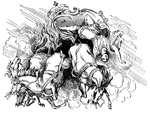
Phaethon
"Then Phaethon beheld the world on fire, and felt the heat intolerable. The air he breathed was like…
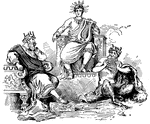
Midas
"Bacchus offered Midas his choice of a reward, whatever he might wish. He asked that whatever he might…

Pluto, Persephone, and Mercury
"Mercury was sent, accompanied by Spring, to demand Persephone of Pluto. The wily monarch consented,…
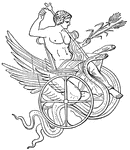
Triptolemus
"After his return Triptolemus built a magnificent temple to Ceres in Eleusis and established the worship…
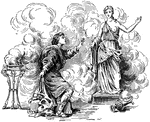
Pygmalion
"The story of Pygmalion and his statue is in all probability an allegory. Pygmalion was a virtuous and…

Apollo and Hyacinthus
"Apollo was passionately fond of a youth named Hyacinthus. He accompanied him in his sports, carried…

Iris
"Iris puts on her robe of many colors, and tingeing the sky with her bow, seeks the palace of the King…
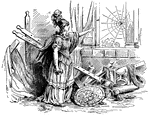
Minerva
"On Minerva's side Varro tells us that Cecrops found an olive tree and a fountain, and that on consulting…
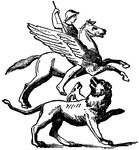
Bellerophon, Pegasus, and the Chimera
"After the conquest of the Chimaera, Bellerophon was exposed to further trials and labors by his unfriendly…

Centaur
"These monsters were represented as men from the head to the loins, while the remainder of the body…
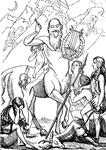
Chiron
"Chiron was instructed by Apollo and Diana, and was renowned for his skill in hunting, medicine, music,…
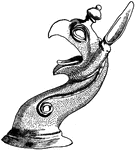
Gryphon
"The griffin is a monster with the body of a lion, the head and wings of an eagle, and back covered…
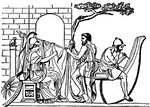
Building the Argo
"At that time the only species of navigation known to the Greeks consisted of small boats or canoes…

Hecate
"He promised her marriage, and as they stood before the alter of Hecate, called the goddess to witness…
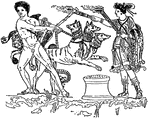
Hercules and Cerberus
"Hercules descended into Hades, accompanied by Mercury and Minerva. He obtained permission from Pluto…
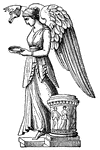
Hebe
"When once the mortal part of him has perished, Juno lays aside her enmity and marries him to Hebe,…

Ganymede
"Hebe was dismissed from her office in consequence of a fall which she met with one day when in attendance…

Theseus and the minotaur
"The Athenians were at that time in deep affiction on account of the tribute which they were forced…
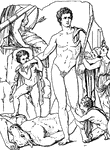
Theseus and the minotaur
"The Athenians were at that time in deep affiction on account of the tribute which they were forced…

The Dioscuri
"Castor and Pollux were the offspring of Leda and the Swan, under which disguise Jupiter had concealed…

Sylvanus
"Sylvanus and Faunus were Latin divinities, whose characteristics are so nearly the same as Pan that…
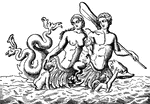
Tritons
"Triton was the son of Neptune and Amphitrite, and the poets made him his father's trumpeter. Proteus…
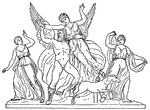
Boreas and Orithyia
"Boreas loved the nymph Orithyia, and tried to play the lover's part, but met with poor success." —Bulfinch,…

Hymen
"Hymen had been called to bless with his presence the nuptials of Orpheus with Eurydice; but though…

Amphion and Zethus
"Amphion was the son of Jupiter and Antiope, queen of Thebes. With his twin brother, Zethus he was exposed…
